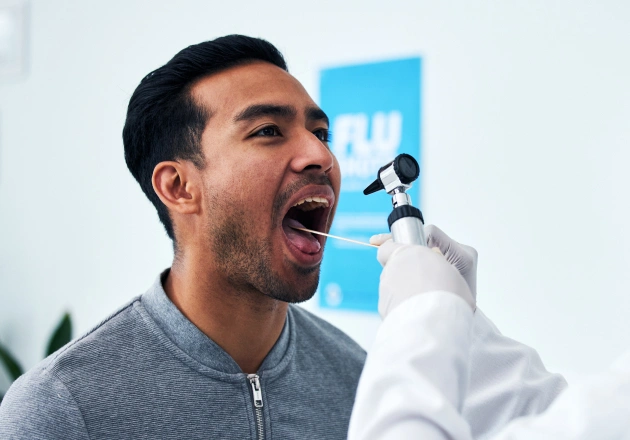
Protect Your Health with Oral Cancer Screenings
At Peachtree Corners Dentistry, we encourage you to schedule an oral cancer screening today. Oral cancer is often overlooked and lacks widespread awareness, yet it claims one life every day in the United States. The high mortality rate is largely due to late-stage diagnoses, as many people wait until symptoms worsen. Early detection and treatment are critical for improving survival rates, so understanding your risk and catching signs early can significantly increase your chances of successful treatment.
Is It Typical to Have an Oral Cancer Screening?
Unfortunately, oral cancer screenings are not commonly performed, which is why this cancer is often not detected early. At Peachtree Corners Dentistry, we recommend scheduling a screening if you’ve never had one. After your initial screening, it’s typically recommended to have one every six months. If you’re in the Peachtree Corners area, contact us today to schedule your appointment.
What Does an Oral Cancer Screening Involve?
At Peachtree Corners Dentistry, we conduct a thorough oral cancer screening by checking for signs of abnormal tissue. We look for visible symptoms such as red or white patches, bumps, hard lumps, rough spots, or shifts in the position of your teeth. The screening primarily involves a visual examination, but we also gently feel your cheeks and the inside of your mouth to detect any unusual lumps or areas of concern. Oral cancer can affect all parts of the mouth, so a comprehensive exam is essential. As technology continues to advance, we may use additional testing methods, which we will gladly explain during your visit. Rest assured, the screening is gentle, and we aim to make you feel comfortable throughout the process.
How Often Should I Get an Oral Cancer Screening?
We recommend visiting Peachtree Corners Dentistry for your first oral cancer screening. Based on your risk factors and the results of the exam, we will advise you on how often you should have a screening. For high-risk patients, we may recommend annual screenings.
Who is at Risk for Developing Oral Cancer?
A common misconception is that only older men are at risk for oral cancer. While men once developed oral cancer at a 10:1 ratio compared to women, this statistic has changed over time, likely due to more similar habits between men and women. With an increase in alcohol consumption and smoking among women, the current ratio is now 2:1. Recent medical research has also revealed that certain strains of the HPV virus can cause oral cancer, which has shifted the way we view and screen for this disease. The HPV virus can be contracted as early as the teenage years, making both men and women, teens and seniors, susceptible to oral cancer. We recommend that all adults be screened for oral cancer, especially those who smoke, drink alcohol, or are aware they have the HPV virus.
Do You Treat Oral Cancer?
At Peachtree Corners Dentistry, we don’t treat oral cancer, but we are here to help detect it. Early detection is crucial when it comes to cancer, as it can literally save your life. Since we are most familiar with the normal appearance of your mouth, we are able to spot any abnormalities. If we notice anything that could be pre-cancerous or cancerous, we may perform a biopsy, where a small tissue sample is taken for further testing. In some cases, we may refer you to a specialist for additional testing and to discuss potential treatment options.
When to Call Us:
You can play a crucial role in detecting oral cancer early. We recommend taking a few seconds after brushing your teeth to check your mouth. Simply run your tongue along your cheeks, gums, and the roof of your mouth. If you notice any rough patches, lumps, or bumps, take note of them and check again a few days later. If the issue was caused by illness or food irritation, it should subside. However, if it doesn’t, schedule an oral cancer screening and exam with our office. Also, keep an eye out for any teeth that shift without an apparent reason. If your teeth are moving out of place, something could be pushing them, and in some cases, that "something" may be cancer.
How Can I Prevent Oral Cancer?
The most important step you can take to reduce your risk of oral cancer is to stop using smokeless tobacco products. This is the leading historical risk factor for developing oral cancer, and while it may be less harmful to your lungs than smoking cigarettes, it can increase your risk of oral cancer by up to 60 times! It's also essential to quit smoking all tobacco products and limit alcohol consumption. While moderate alcohol use may not be harmful, regular drinking or binge drinking significantly raises your risk. Additionally, limit sun exposure and avoid sunburns when possible. For protection against the HPV virus, consult your physician to see if you're a candidate for the vaccine, and consider being tested to determine if you’ve already contracted the virus.

